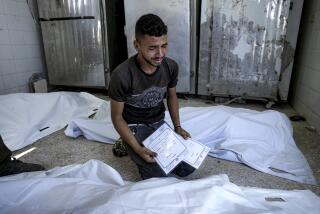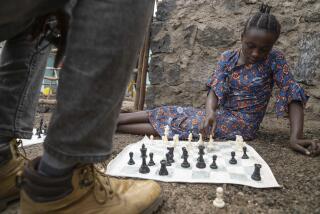In Africa, Boko Haram is forcing more kidnapped children into âsuicideâ bombings, UNICEF says
Reporting from Johannesburg, South Africa â Theyâre called âsuicideâ bombers, but the children sent by Nigerian terror group Boko Haram to detonate bombs and kill people are not given a choice. They are mostly girls, some as young as 8.
Boko Haramâs cruelty to children â its killings, abductions, coerced marriages, slavery and forced âsuicideâ bombings â plumbs a horrifying low that other Islamist extremists have yet to reach.
The groupâs leader, Abubakar Shekau, shocked the world with his grim smile as he announced that 276 schoolgirls abducted in Chibok, in Nigeriaâs Borno state, in April 2014 would be sold into slavery.
NEWSLETTER: Get the dayâs top headlines from Times Editor Davan Maharaj >>
Since then the group has ramped up the use of children as bombers, according to a report Tuesday by UNICEF called âBeyond Chibok.â
Last year, 44 children were sent by Boko Haram to detonate bombs in crowded places such as mosques, markets and a displaced persons camp, up from four the year before. Three quarters of them were girls.
âThe use of children, especially girls, as suicide bombers has become one of the defining and alarming features of the conflict,â the report said.
Between January 2014 and February 2016, there were 40 âsuicideâ attacks involving one more children, 21 of them in Cameroon, 17 in Nigeria and two in Chad, according to the report.
Women and girls in the regions wear long loose gowns, making it easy to conceal explosives.
In January, two female bombers hit a mosque in Kolofata, northern Cameroon, killing at least 10. A few days later a boy detonated a bomb at a mosque in Nguetchewe village in Cameroon, killing four. In March, 22 people died in Nigeria after two female bombers detonated devices.
In February, 58 people were killed in Dikwa, Nigeria, when two females detonated bombs. A third member of the bombing mission decided not to set off her explosives, because she spotted her family in the camp, according to Nigerian media citing authorities.
Boko Haram is fighting to establish an Islamic state in Nigeria and last year pledged allegiance to the Islamic State extremist group. In recent months, military forces from Nigeria and neighboring countries have freed thousands of people, including women and girls who had been abducted and forced to become sexual slaves.
Doune Porter, UNICEF spokeswoman in Nigeria, last week met girls in Maiduguri, the capital of Nigeriaâs Borno state, who had been imprisoned by Boko Haram, many of them traumatized by repeated rapes and abuse.
Some had seen their friends forced by Boko Haram to carry out bombings.
Porter said the bombings couldnât be called suicide attacks because the children were either forced to carry them out or were not of an age to understand the consequences of their actions. Some may have been misled or brainwashed by adults.
âI met one girl who told me two of her friends were forced to carry out bombings. She said they didnât want to do it. They were forced to do it.
âOne of them told me that girls who had refused to âmarryâ Boko Haram soldiers had been forced to act as so-called âsuicideâ bombers,â Porter said. âThey were all girls who were captured by Boko Haram when it took over their villages.
âNow, many of them are facing fear from their communities. Thatâs one of the terrible, tragic effects of using children to carry out bombings. When they return to their communities, they very often face stigmatization and isolation because theyâre seen as being tainted by Boko Haram.â
The report warned that abducted girls faced the risk of being rejected and even killed by suspicious communities.
Many of the girls and women forced into marriage with Boko Haram fighters are in displaced persons camps in Maiduguri. Some told Porter their parents had been killed in Boko Haram attacks. Others didnât know where their parents were. But some had found their parents and been accepted by them.
âTheyâre all very traumatized,â Porter said. âThey have gone through the most awful beatings and rapes. Some of them have been raped by many different people, some by just one man. Some of them are pregnant or have had children.
âOne girl told me she was held in a house and there were 20 girls and women ranging from 12 years old to middle-aged women. And Boko Haram soldiers would just come and rape them.â
One 17-year-old from Cameroon was visiting her mother in a Nigerian village when Boko Haram attacked, abducted her, locked her in a house and forced her to âmarryâ a fighter, according to the report. She became pregnant and gave birth to a boy while in captivity.
When she was freed and arrived in a displaced personâs camp, she faced suspicion and hostility.
âWhen I arrived at the camp, I didnât have anything,â she told UNICEF researchers. âI had to borrow from people. Some women would beat me, they would chase me away. They said, âyou are a Boko Haram wife, donât come near us!â
Join the conversation on Facebook >>
âIf I used their washing basin to clean, they would say, âYou are Boko Haram wife, donât touch our basinâ. Everywhere I went, they would abuse me and call me a Boko Haram wife. I felt as if I was neglected; I did not have anybody to help or support me.
âWhen I feel sadness in my heart, sometimes I cry and wipe my tears away.â
About 2.3 million people, including 1.3 million children, have been displaced by the crisis, according to UNICEF. More than 670,000 children are not able to go to school because of the conflict.
Boko Haram attacks prevented farmers from planting crops, herders from keeping cattle and fisherman from going to fish in Lake Chad. UNICEF last year assisted 93,000 in the region with severe chronic malnutrition.
Follow @RobynDixon_LAT for news from Africa.
ALSO
Two desert islands: The gift for the country that has everything
U2 singer Bono tells Congress comedy can help in fight against extremists
Kerry, in L.A., touts Pacific trade deal as vital to Hollywood, Silicon Valley
More to Read
Sign up for Essential California
The most important California stories and recommendations in your inbox every morning.
You may occasionally receive promotional content from the Los Angeles Times.










